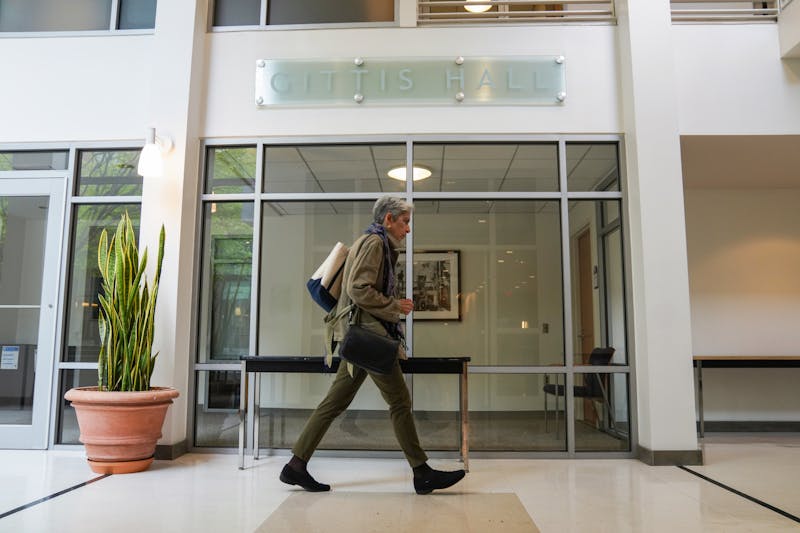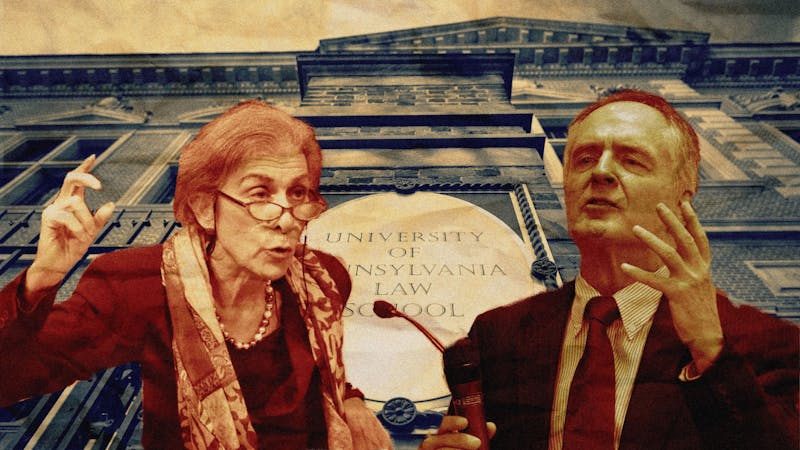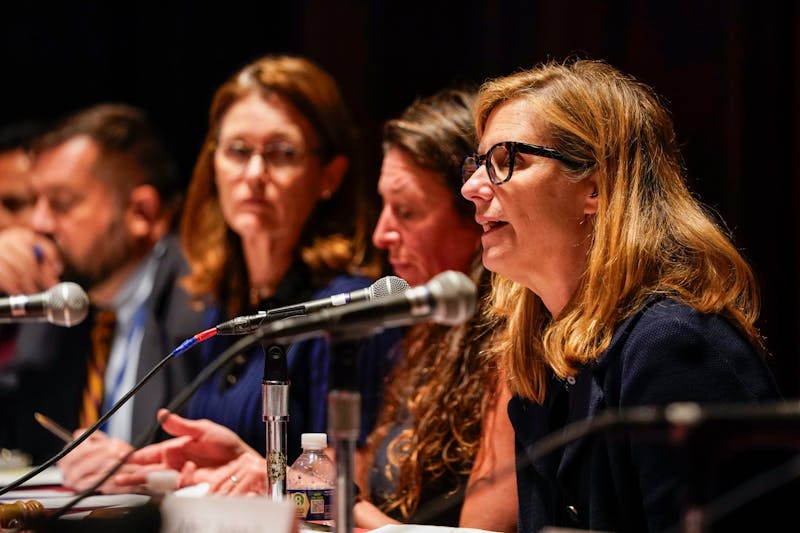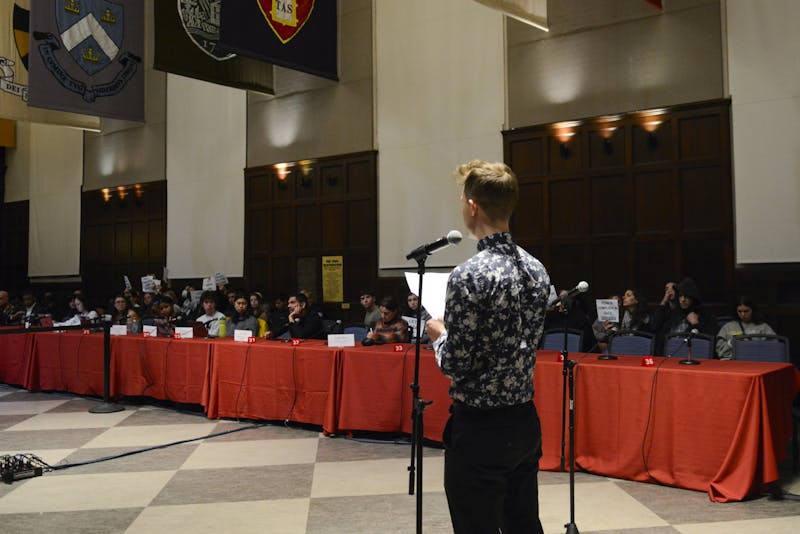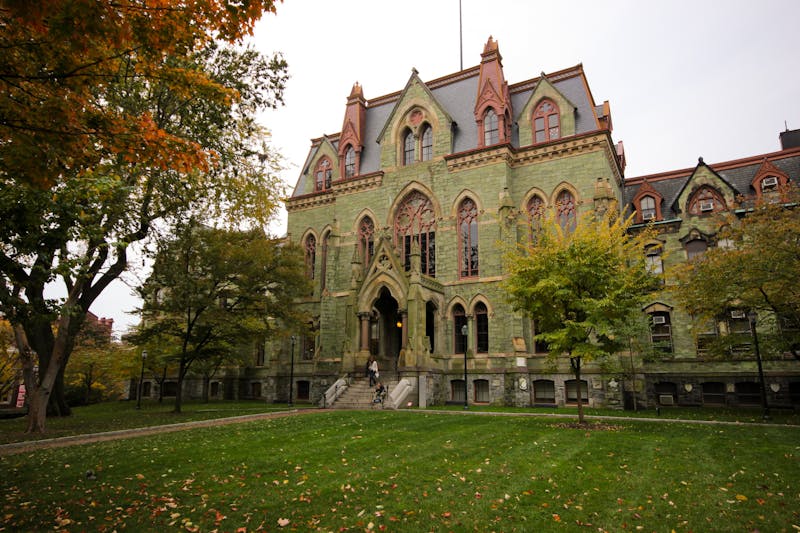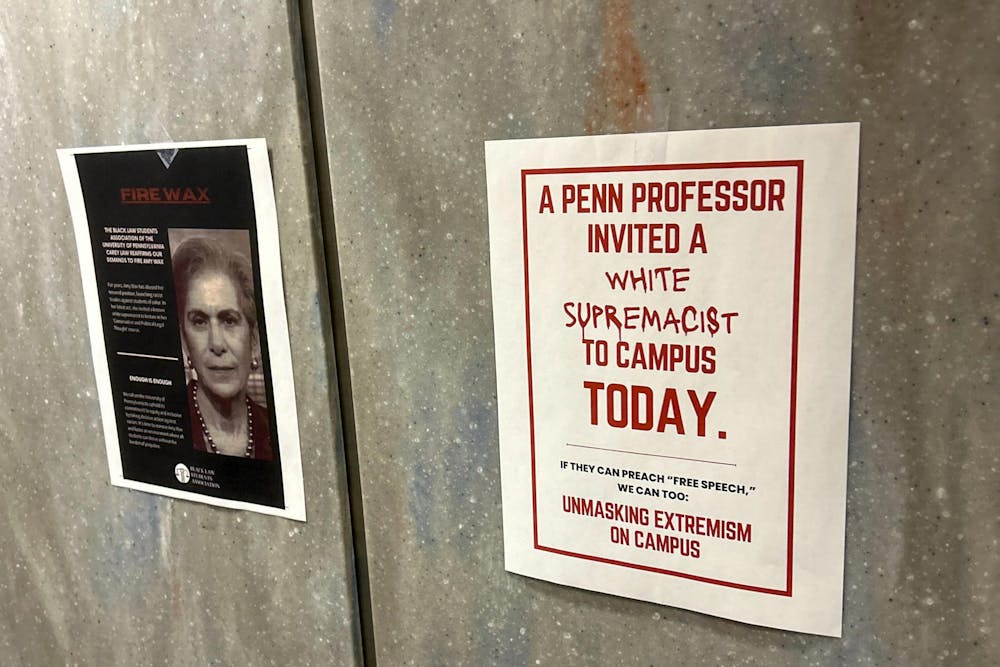
Posters at the Biddle Law Library were placed in the elevators advocating for the firing of Amy Wax (Photo courtesy of Abhiram Juvvadi).
Around 80 University of Pennsylvania Carey Law School students protested outside of Professor Amy Wax’s classroom on Nov. 28, opposing her invitation of white nationalist Jared Taylor as a guest speaker.
The students engaged in a protest in the Penn Carey Law courtyard outside of the classroom hosting Taylor. The protest contained mostly law students unaffiliated with any specific affinity group, with some Black Law Students Association and Penn Law National Lawyers Guild members present. Taylor's appearance prompted a school-wide email from Dean and Bernard G. Segal Professor of Law of Penn Carey Law Sophia Lee on Nov. 21, in what appeared to be Lee's first public comments on Wax as dean.
"Campuses across the country are grappling with the bounds of academic freedom," Lee wrote in the email, which was obtained by The Daily Pennsylvanian. "Many have raised similar questions at Penn Carey Law because Professor Amy Wax has invited Jared Taylor to speak to her class."
Taylor — editor of American Renaissance, a publication that the Southern Poverty Law Center calls a promoter of eugenics and pseudoscience — spoke on Nov. 28 at Wax's class of LAW 9560: “Conservative and Political Legal Thought” as scheduled on a course syllabus obtained by the DP in September. This was at least Taylor’s second visit to campus.
Members of BLSA distributed flyers about Wax and Taylor and asked students to wear red in solidarity before moving their location to stand in front of the classroom. Once the protest started, Penn Law National Lawyers Guild and the BLSA both announced the protest on their respective Instagram accounts.
Second-year Penn Carey Law student and BLSA Advocacy Co-Chair Virginia Richards told the DP that Wax began recording the student protestors while Taylor made condescending remarks when they saw the protest.
Isaac Hoeh, another second-year Penn Carey Law student, said that he heard about the protest from students involved in organizing against Wax and her connections to white nationalism. He said that he saw the protest as an opportunity for students to stand in solidarity for those who Wax has targeted and made feel unsafe.
“Why would the law school allow her to teach when they've already admitted and come to terms to some extent with the fact that her teaching and her ideology and her beliefs are white supremacist?” Hoeh said.
Second-year Penn Carey Law student and BLSA Advocacy Co-Chair Virginia Richards said that the protest formed spontaneously, with word spreading around campus of where the talk was occurring approximately 30 minutes prior to the end of the lecture. The students held posters, chanted, and booed Wax and Taylor as they were leaving the classroom, according to Richards.
Wax took videos of protestors, and Taylor made "condescending comments," according to the protest attendees. Hoeh described the confrontation of students with Wax and Taylor as they exited the classroom as "really intense," adding that Taylor talked with police officers present.
“Wax did a whip around the corridor and was taking photos of students, standing in our faces, as we did our chants and held signs," Richards said. "She looked pretty smug about the entire situation."
An Open Expression Officer warned that, according to open expression guidelines, students would open themselves up to potential disciplinary action if they entered the classroom, attendees said.
Hoeh suggested that the police appeared to be there to protect Wax from the students.
“It was very clear that they weren't there to protect students against white supremacy," Hoeh said. "They're there to protect the white supremacist against students.”
Taylor’s return to Penn’s campus marks approximately 23 months since the sanctions process against Amy Wax began. The University has alleged that Wax’s actions, including but not limited to inviting Taylor to the class, violate Penn’s behavioral standards.
In June 2022, former Penn Carey Law Dean Ted Ruger wrote that Wax's invitation to Taylor "crosses the line of what is acceptable in a University environment where principles of non-discrimination apply,” in a document where he asked the University to impose a “major sanction” on Wax.
The members of BLSA's Executive Board told the DP that all of BLSA's activities adhered to the University's open expression guidelines.
“The invited speaker was not interrupted nor was he disallowed to speak," the Executive Board wrote in a statement. "What he encountered afterwards was the student body exercising its own speech.”
Lee sent a letter to the law community on Nov. 21, stating that while student groups and faculty may develop programming that is "responsive to current events," Penn's open expression guidelines do not permit protestors to "disrupt or shut down" a speaker nor permit demonstrations in rooms where classes are being held.
Lee also wrote that due to the confidential, ongoing University proceedings against Wax that were initiated in 2022, she cannot make a comment about the professor.
First-year Penn Carey Law student and member of Penn Law Lambda Maya Gomberg told the DP that she was frustrated with Lee’s statement and criticized Penn Carey Law’s handling of what is considered “hate speech," while Penn Carey Law Council of Student Representatives President Vinila Varghese said that Taylor’s “derogatory, unfounded, and unacademic” views have no place in an academic discussion.
A statement from CSR and a joint statement by the Pacific American Law Students Association, the Latinx American Law Students Association, and Penn Carey Law Lambda condemned Wax and Taylor.
The joint statement criticizes Penn Carey Law for “proudly tout[ing] its diversity statistics on public-facing materials,” while allowing “Wax and her guest speakers [to] perpetuate violence against our communities" in opposition to Penn Carey Law's "commitment to diversity and inclusion."
In September, when the DP first reported that Taylor would speak at Wax's class, BLSA posted a statement on their Instagram urging the administration to fire Wax for inviting Taylor and for her conduct.
"It’s also about any amount of transparency of what power we have to tell people that we don’t want dangerous, hostile, and racist people here," Gomberg said. "What are the rules?"
The Daily Pennsylvanian is an independent, student-run newspaper. Please consider making a donation to support the coverage that shapes the University. Your generosity ensures a future of strong journalism at Penn.
Donate







